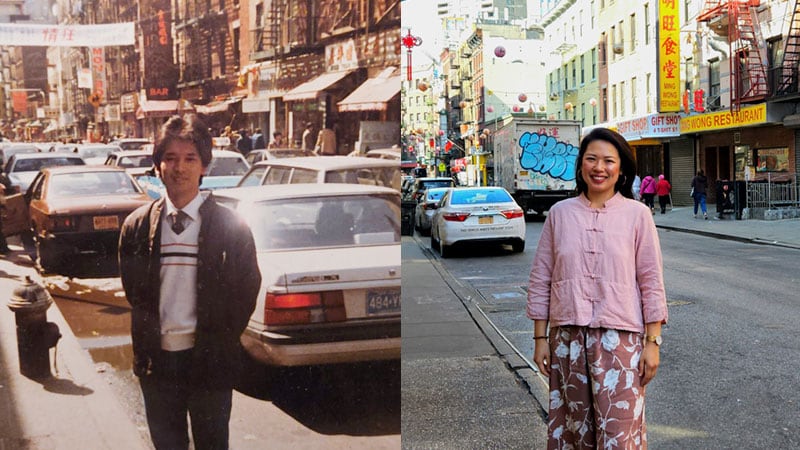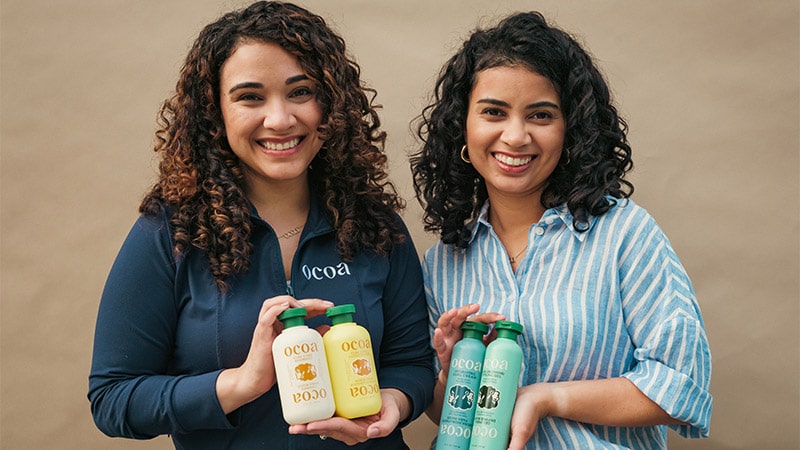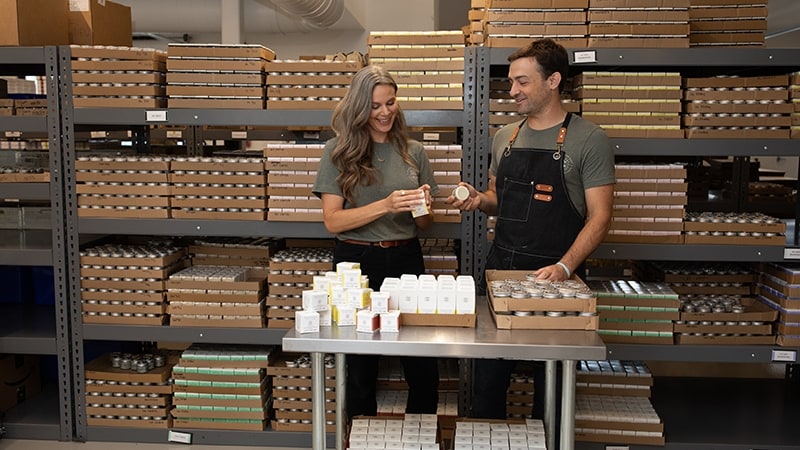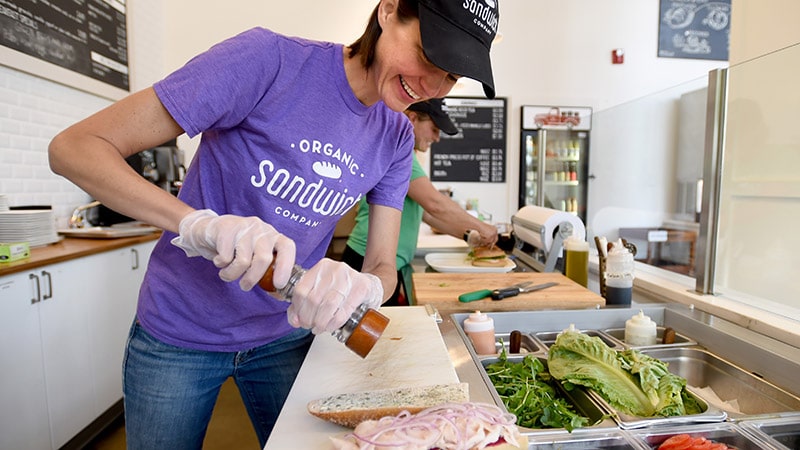Talking food and family with Pez Cantina
With bold moves and big flavor, Pez Cantina brings a taste of Baja to L.A. Presented by Chase for Business.

Participants compensated
There’s no shortage of Mexican food in Los Angeles. From tiny taquerias slinging big flavor in East L.A. to Tajín fruit stands tucked onto busy street corners, options abound. Yet Pez Cantina has managed to carve out its own niche. Known for tangy ceviche and fresh-squeezed margaritas, this Baja-style restaurant transports patrons from the city to the sea. If you ask co-owner Lucy Ramirez Thompson what sets her restaurant apart, she’ll say it’s more than the food — it’s family.
Offering a taste of home
Pez Cantina is a family business through and through. It’s owned by Lucy and her husband, Chef Bret Thompson, and Lucy’s sisters work at the restaurant, too. Some of their bestsellers include family recipes for carnitas and pozole verde, a type of chicken soup made with tomatillos and hominy. According to Lucy, people can taste that legacy. “These dishes have been with us for so long,” she says. “The food tells a story.”
In a broader sense, Lucy also considers the Pez Cantina staff to be family. “A lot of our staff has been with us for seven or eight years — almost from the beginning,” she says. They’ve worked together through too many late nights to count, forming deep bonds rooted in trust and care for each other as people, not just employers and employees.
That warmth extends to the restaurant patrons as well. Every day before the doors open, Lucy reminds the staff to treat patrons like old friends and make them comfortable from the moment they arrive. “That has allowed us to really stand out in the market,” she says. “When someone treats you like family and knows you by name or makes a point to try and remember you, I think the food tastes better.”
“When someone treats you like family … I think the food tastes better.”
Lucy Ramirez Thompson
Co-owner, Pez Cantina
An idea born on board
Lucy and Bret came up with the idea for Pez Cantina while on a fishing trip to Mexico, where they made ceviche right on the boat with fresh-caught dorado. “It was amazing,” she says. “I remember sitting there and eating together and thinking, “We’ve got to open something like this in L.A.’”
At the time, Lucy was working in the fashion industry, and Bret was running his own café. When Lucy became pregnant with their second child, she wanted to transition into a role that would require less travel. She decided to join Bret at the café as its catering director.
She built a strong network of catering clients, and one of those connections invited her and Bret to open a restaurant in a nearby building. “When we had the opportunity to start a restaurant, we already knew what we wanted,” Lucy says. “The idea for Pez Cantina was already born, and we went into full action.”
Ready, set, restaurant
Bret and Lucy were ready to hit the ground running — as soon as they finished a major retrofit. “We were turning a photocopy business into a restaurant, which meant we had to bring in plumbing, electrical and mechanical — all in a high-rise building with unionized workers,” Lucy says. “Everything was very time-consuming and very costly. But we were willing to take that risk.”
They funded their renovation with proceeds from selling the café, along with financing from private investors, a Small Business Administration (SBA) loan and a tenant improvement allowance from their landlord.
Although Lucy and Bret found their lease by serendipity, it was their resourcefulness and perseverance that got them to the grand opening a year later. The cantina took off quickly, thanks in part to the large number of people filling the skyscrapers of downtown L.A. That is, until the COVID-19 pandemic emptied out the neighborhood.
“As great as it was to sign a lease in the financial district surrounded by thousands and thousands of employees, they all disappeared overnight,” Lucy recalls. Never ones to back away from a challenge, they began to experiment with new revenue streams, like family meals, bottled margaritas and a small-but-mighty source of flavor: Pez Powder.
Passive income with a kick
When most people sit down at a Mexican restaurant, the chips and salsa are the first thing they taste. To Lucy, it’s crucial to get that first bite right. “Chips and salsa are what define a good Mexican restaurant,” she says.
She and Bret wanted to serve craveable, irresistible chips, so they created their own signature seasoning blend to help set them apart. Spicy, savory and complex, the flavor was an instant hit.
“It got to the point where people were like, ‘What is on these chips?’” Lucy says. “I told them that it’s our own seasoning. And they would ask, ‘Can I take some home?’” Lucy would put seasoning in salsa to-go containers, and before long, customers were returning for more.
People started calling the seasoning blend Pez Powder, and the name stuck. Lucy and Bret found a packer and distributor so they could bring the seasoning blend to retail stores — a savvy move that helped them survive the COVID-19 shutdowns.
“It generated passive income,” Lucy says. “I wasn’t cooking a meal.”
Despite the spice blend’s popularity in the cantina, it didn’t sell in stores as well as they’d hoped. Lucy and Bret decided it was time for a rebrand. “We shelved Pez Powder for a while, and now it’s called Boom Chili and Lime,” Lucy says. “And I am in love with the new name and logo.”
They’re also taking a new approach to marketing and distribution. “With Pez Powder, I was a little too anxious,” Lucy says. “I didn’t feel like it had enough of a grassroots approach.” This time, they’re using social media to build a following for Boom Chili and Lime before putting it on shelves. As Lucy says, “You just never know when it could go viral.”
The process of rebranding and relaunching a product isn’t easy. Luckily, Lucy didn’t have to do it alone, even while Bret remained focused on running other aspects of the restaurant. She joined the Chase for Business Coaching for Impact℠ program, which meant she had a business consultant by her side at every step.
“The Coaching for Impact program helped me create a brand and stick to it consistently,” she says. “We focused on branding Pez Cantina with my face and name to give it that authenticity. At the end of the day, it’s not some huge corporation; we’re a small business.”
“It felt so good to have someone I could turn to for advice whenever I hit a wall. Having that support has been tremendous.”
Lucy Ramirez Thompson
Co-owner, Pez Cantina
One day, a commercial banker approached Lucy about Coaching for Impact’s 1:1 executive consulting program. They pointed out that Lucy could be taking advantage of more opportunities, like securing a catering contract with the city or getting certified as a women-owned business, since she has more control than Bret.
“There’s so much that you tend to forget as far as basic business skills,” Lucy says. “Sometimes I get so involved with day-to-day operations that it’s hard to get out of tunnel vision.”
Coaching for Impact has also helped Lucy with the financial side of things, from opening lines of credit to expanding and reformatting the business. “My consultant really held my hand through a lot of things,” Lucy says. “It felt so good to have someone I could turn to for advice whenever I hit a wall. Having that support has been tremendous.”
Her consultant is now the one helping Lucy push forward with the rebranded Boom Chili and Lime seasoning, consulting on everything from social media marketing practices to a go-to-market strategy. “We’re still on a cell phone basis,” she says. “I can ask questions whenever I want.”
For Lucy, her Coaching for Impact consultant is much more than a transactional relationship — they’re part of the Pez Cantina family. “It takes a village to run a business,” she says, “and I feel like the Coaching for Impact program really reaffirms that fact.”
Advice from 10 years of success
With two locations, a decade in operation and a new seasoning blend about to hit the market, Pez Cantina is thriving. But for Lucy, running a restaurant is about so much more than making a living.
“Hosting parties and celebrations is deeply embedded in my culture,” she says, “and I feel like I get to do that every day.” She’s seen the same people return to the restaurant time and again for special occasions like graduations, birthdays and anniversaries. In other words, she gets to play a supporting role in creating happy memories for other people’s families.
“The restaurant industry is an intense labor of love,” Lucy says. “You have to do it for that first.”
Help grow your business with Chase
Learn more about Chase’s resources for business owners, including our digital education courses and Coaching for Impact program. If you’re ready to take the next step, get in touch with a Chase business banker to find out how we can help you reach your goals.



